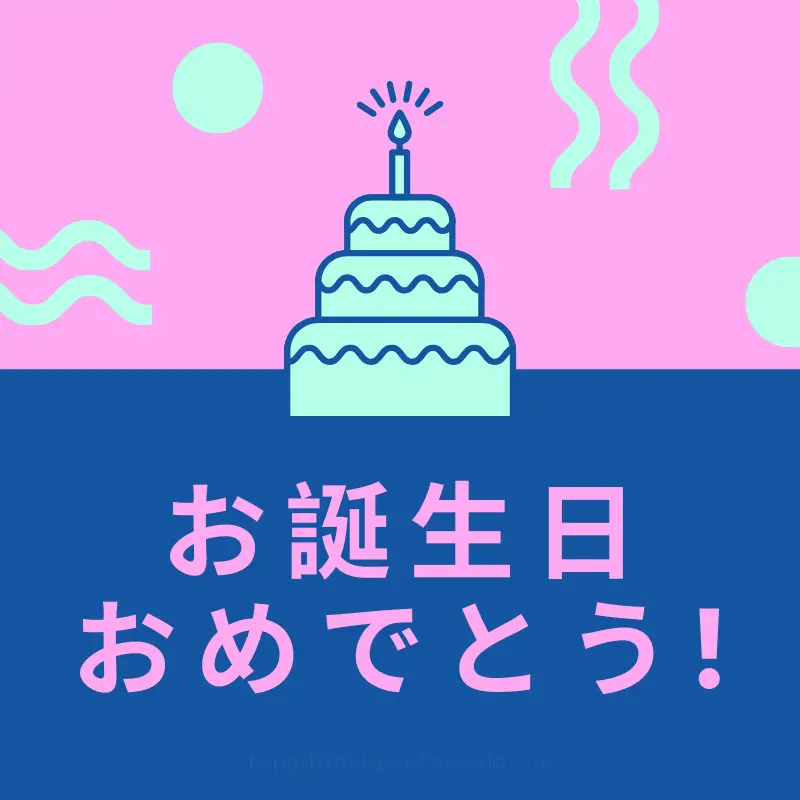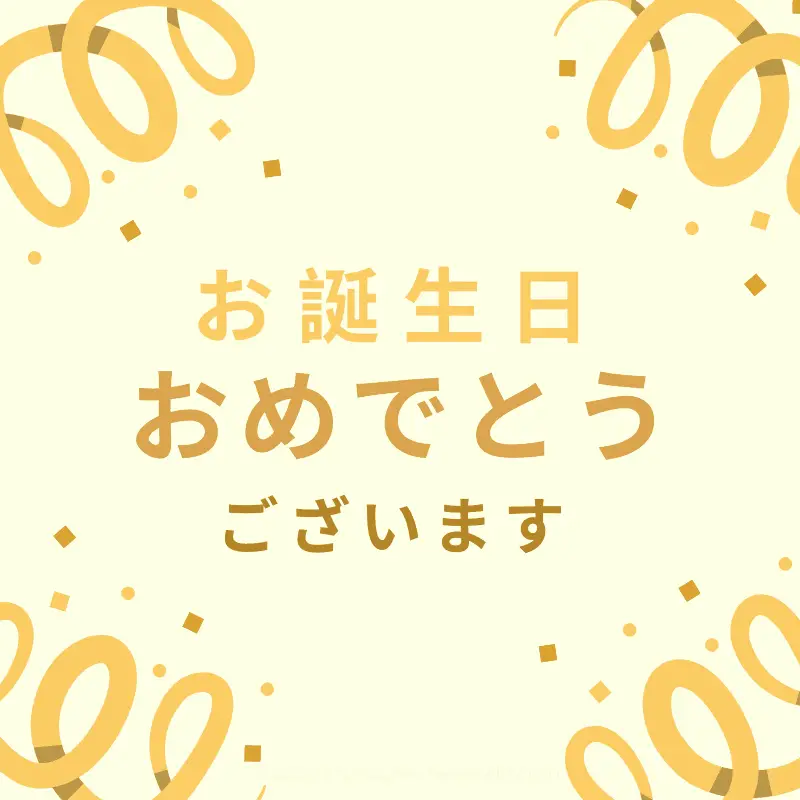Have you ever wondered how to wish someone a happy birthday in Japanese? Well, buckle up because we're diving deep into the colorful world of Japanese birthday greetings! Whether you're planning a surprise for your Japanese-speaking friend or just curious about how they celebrate this special day, you're in the right place. In this article, we'll cover everything you need to know about saying "happy birthday" in Japanese, from the basic phrases to the cultural nuances that make it so fascinating.
Birthdays are a universal celebration, but every culture puts its own twist on it. For the Japanese, birthdays are not just about cutting cakes and opening gifts. They're an opportunity to express gratitude, strengthen relationships, and honor traditions that have been passed down for generations. So, if you're ready to learn how to say "happy birthday" in Japanese and understand what it truly means, keep reading!
This guide is packed with practical tips, cultural insights, and even a few fun facts to make your learning journey enjoyable. By the end of this article, you'll not only know how to wish someone a happy birthday in Japanese but also appreciate the deeper meaning behind the words. Let's get started!
Read also:Thermatru Doors The Ultimate Guide To Enhancing Your Homes Security And Style
Table of Contents
- The Basic Phrase: "Tanjobi Omedetou"
- Understanding the Cultural Context
- Formal Greetings for Special Occasions
- Informal Ways to Say Happy Birthday
- Common Mistakes to Avoid
- Japanese Birthday Celebration Traditions
- The Historical Significance of Birthdays in Japan
- A Modern Approach to Wishing Happy Birthday
- Language Tips for Beginners
- Conclusion: Spread Joy with Japanese Greetings
The Basic Phrase: "Tanjobi Omedetou"
Let's start with the basics. The most common way to say "happy birthday" in Japanese is "Tanjobi Omedetou" (誕生日おめでとう). This phrase literally translates to "Congratulations on your birthday." It's polite, straightforward, and perfect for almost any situation. If you're new to the Japanese language, this is the phrase you should commit to memory first.
Now, here's a quick breakdown:
- Tanjobi: This means "birthday" in Japanese.
- Omedetou: This means "congratulations" or "happy" in Japanese.
When you combine these two words, you get a phrase that's both warm and respectful. But wait, there's more! Depending on the context, you might want to tweak this phrase slightly. We'll cover that in the next section.
Why Is "Tanjobi Omedetou" So Popular?
Think of "Tanjobi Omedetou" as the golden standard for birthday greetings in Japan. It's versatile enough to work in both formal and informal settings. Whether you're wishing your boss, a close friend, or even a distant relative, this phrase will never steer you wrong.
Understanding the Cultural Context
Language is deeply intertwined with culture, and Japanese is no exception. To truly understand why "Tanjobi Omedetou" is so significant, you need to dive into the cultural context of birthdays in Japan.
Read also:Los Girasoles Unveiling The Hidden Beauty Of Sunflower Wonders
Birthdays in Japan are all about respect and gratitude. While Western cultures often emphasize individualism and self-expression during birthdays, the Japanese approach is more communal. It's not just about celebrating the person who was born—it's also about acknowledging the hard work and sacrifices of their family, especially their parents.
For example, it's common for Japanese people to thank their mothers on their birthdays. This gesture reflects the deep respect they have for the role of family in shaping their lives. So, when you say "Tanjobi Omedetou," you're not just wishing someone a happy day; you're also honoring the broader network of relationships that make their life meaningful.
Key Cultural Nuances to Keep in Mind
Here are a few cultural nuances you should be aware of when wishing someone a happy birthday in Japan:
- Age Matters: In Japan, age is often seen as a sign of wisdom and experience. So, when you wish someone a happy birthday, you're also acknowledging their growth and maturity.
- Group Celebrations: Many Japanese people prefer celebrating birthdays with family and close friends rather than throwing big parties. This reflects their preference for intimate, meaningful gatherings.
- Gift-Giving Etiquette: If you're planning to give a gift, make sure it's wrapped nicely. Presentation is key in Japanese culture, and a beautifully wrapped gift shows respect and thoughtfulness.
Formal Greetings for Special Occasions
Not all birthdays are created equal. Some are more special than others, like turning 20 or 60. In Japan, these milestones are celebrated with extra fanfare, and your birthday greeting should reflect that.
For formal occasions, you can use the phrase "Tanjobi Omedetou Gozaimasu" (誕生日おめでとうございます). This is a more polite and respectful version of "Tanjobi Omedetou." The addition of "Gozaimasu" makes the phrase suitable for formal settings, such as business meetings or family gatherings.
When Should You Use "Tanjobi Omedetou Gozaimasu"?
This phrase is perfect for situations where you want to show extra respect. For example:
- Wishing your boss or superior a happy birthday
- Attending a formal birthday party
- Writing a birthday card for someone you respect
Remember, in Japanese culture, politeness is key. Using the right level of formality can make a big difference in how your message is received.
Informal Ways to Say Happy Birthday
Not every birthday calls for formal greetings. Sometimes, you just want to keep things casual and fun. If you're celebrating with close friends or family, you can use more informal phrases like "Omedetou" (おめでとう) or simply "Tanjobi!" (誕生日!).
These shorter phrases are perfect for text messages, social media posts, or casual conversations. They convey warmth and familiarity without being too formal.
Fun Ways to Spice Up Your Greeting
Want to make your birthday greeting stand out? Here are a few creative ideas:
- Add emojis or cute illustrations to your message.
- Include a funny story or memory related to the person's birthday.
- Write a short poem or song in Japanese.
Remember, the key is to make the person feel special and appreciated. A little creativity can go a long way!
Common Mistakes to Avoid
Learning a new language is exciting, but it's also easy to make mistakes. Here are a few common pitfalls to watch out for when wishing someone a happy birthday in Japanese:
1. Overusing "Sugoi": While "Sugoi" (すごい) means "amazing" or "incredible," it's not typically used in birthday greetings. Stick to "Omedetou" or "Tanjobi Omedetou" instead.
2. Forgetting Politeness Markers: In Japanese, politeness markers like "desu" and "masu" are important. Make sure to include them in formal settings.
3. Ignoring Cultural Nuances: As we discussed earlier, birthdays in Japan are about respect and gratitude. Avoid making your greeting too self-centered or overly enthusiastic.
How to Avoid These Mistakes
Here are a few tips to help you avoid common mistakes:
- Practice your phrases with a native speaker or language partner.
- Read up on Japanese culture and traditions to better understand the context.
- Use language learning apps or resources to improve your pronunciation and grammar.
Japanese Birthday Celebration Traditions
Birthdays in Japan are celebrated in many unique ways. From special foods to traditional rituals, there's always something interesting to discover. Here are a few traditions you might want to know about:
1. Sekihan: This is a type of sticky rice steamed with azuki beans. It's considered a lucky food and is often served during celebrations, including birthdays.
2. Kimono on Special Occasions: For milestone birthdays, some people wear traditional kimonos to mark the occasion. This is especially common for the "kanreki" (還暦) celebration at age 60.
3. Family Gatherings: In Japan, birthdays are often celebrated with family. It's a time to come together, share stories, and enjoy each other's company.
Modern Twists on Traditional Celebrations
While traditional celebrations are still popular, many Japanese people are incorporating modern elements into their birthday festivities. For example, karaoke parties, theme park visits, and even virtual celebrations are becoming more common, especially among younger generations.
The Historical Significance of Birthdays in Japan
Birthdays haven't always been a big deal in Japan. In fact, they weren't widely celebrated until the late 19th century, when Western influences began to take hold. Before that, most people focused on seasonal festivals and family milestones rather than individual birthdays.
Today, however, birthdays are an important part of Japanese culture. They're seen as opportunities to reflect on one's life, express gratitude, and strengthen relationships. This shift reflects the broader changes in Japanese society over the past century.
How Birthdays Have Evolved Over Time
Here's a quick timeline of how birthdays have evolved in Japan:
- Pre-19th Century: Birthdays were not widely celebrated. People focused on family and community events instead.
- Meiji Era (1868-1912): Western influences began to shape Japanese culture, and birthdays started to gain popularity.
- Modern Era: Today, birthdays are celebrated with enthusiasm, especially among younger generations.
A Modern Approach to Wishing Happy Birthday
In today's digital age, there are countless ways to wish someone a happy birthday in Japanese. From social media posts to video messages, the possibilities are endless. Here are a few modern approaches you can try:
1. Social Media: Platforms like Instagram, Twitter, and TikTok are great for sharing birthday wishes. You can use hashtags like #誕生日 or #おめでとう to make your message more visible.
2. Video Messages: If you want to go the extra mile, record a short video wishing the person a happy birthday. It's a personal touch that's sure to make them smile.
3. Virtual Cards: There are plenty of apps and websites that allow you to create digital birthday cards. These can be customized with photos, music, and even animations.
Tips for Making Your Message Stand Out
Here are a few tips to help you make your birthday message memorable:
- Personalize your message by including specific details about the person.
- Use humor or creativity to make your greeting more engaging.
- Consider the recipient's preferences and tailor your message accordingly.
Language Tips for Beginners
If you're new to the Japanese language, don't worry! Learning how to say "happy birthday" is a great place to start. Here are a few tips to help you improve your skills:
1. Practice Pronunciation: Japanese pronunciation can be tricky at first, but with practice, you'll get the hang of it. Use language learning apps or YouTube videos to improve your skills.
2. Learn Key Phrases: Start by memorizing a few key phrases, such as "Tanjobi Omedetou" and "Omedetou Go


